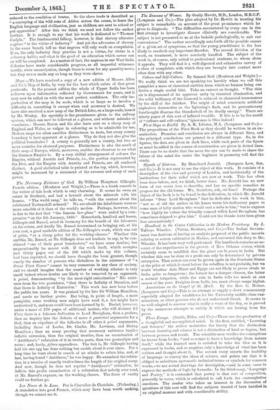The Necessary Existence of God. By William Honyman Gillespie. Fourth
edition. (Houlston and Wright.)—There is a frank conceit in the writer of this book which is very charming. It seems he owns an estate in Scotland, and had a lawsuit about the minerals with his lessees. " The world rang," he tells us, " with the contest about the celebrated Torbanehill mineral." We are afraid the inhabitants were no more sensible of it than of the world's motion. Perhaps, however, this is due to the fact that "the famous law-pleas" were ended by a com- promise " on the 4th January, 1860." Henceforth, landlord and lessee, Gillespie and Russel, acted in harmony for the benefit of the labourers on the estate, and finally Mr. Russel determined on bringing out, at his own cost, a good readable edition of Mr. Gillespie's work, which was out of print, " at a cheap price for the working-classes." Whether this entitles Mr. Russel, as Mr. Gillespie does not hesitate to say, to be con- sidered " one of their great benefactors," we have some doubts ; but unquestionably he meant well. If the work itself, which occupies just thirty pages out of the 500 which make up this volume, had been reprinted, we should have thought the boon greater, though surely the number of persons who disbelieve in the existence of " a Great First Canso " cannot be very numerous in any class of society, and we should imagine that the number of working atheists is very small indeed whose doubts are likely to be removed by an argument, a priori, demonstrating " by the most rigid ratiocination " His exist- ence from the two postulates, " that there is Infinity of Duration, and that there is Infinity of Extension." This work has now been before the public ten years. It was praised by the late Sir William Hamilton, and needs no further praise. But being, in point of length, a mere pamphlet, some working men might have read it, a few might have understood it, and none could have been harmed by it. Buried, however, under a mass of 370 pages of additional matter, who will disinter it? First there is a fulsome dedication to Lord Brougham, then a preface, then an inquiry into the defects of mere a posteriori arguments for a God, then an expoiure of the fallacies in all other el priori arguments, including those of Locke, Dr. Clarke, Mr. Lowman, and Bishop Hamilton ; then an essay proving that necessary existence implies infinite extension, then the original treatise, then an examination of " Antitheos's " refutation of it in twelve parts, then two postscripts and notes ; and, lastly, fifteen appendices. The fact is, Mr. Gillespie having laid his one egg has done nothing but cackle about it ever since. For a long time he went about in search of an atheist to refute him, and, at last, having found " Antitheos," he was happy. He examined the refuta- tion in a treatise of exactly twelve times the length of his original essay. And now, though he does not reprint " Antitheos's" refutation, he inflicts this prolix examination of a refutation that nobody ever read, at Mr. Russel's expense, on the working classes. The force of vanity could no further go.






























 Previous page
Previous page